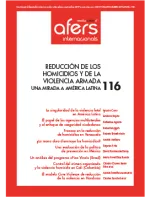Do heavy-handed tactics reduce homicides? The case of Venezuela

This article examines the effectiveness of mano dura (heavy-handed) policies in reducing homicides by studying the case of Venezuela in the period 2012-2015 and gives particular attention to policies involving police violence. Although firm hand policies involve a set of strategies and discourses that revolve around the crime and the institutional response to it, this paper exclusively addresses police interventions that involve increased coercion and violence as a formula for tackling criminality. Over these years, policies have been tested out in Venezuela that involve greater police violence on the pretext of defeating the high levels of criminal violence. But rather than the expected effects of reducing violence and homicides, both have grown significantly.
Key words: police violence, homicides, criminal policy, institutional violence, Venezuela
DOI: doi.org/10.24241/rcai.2017.116.2.77
>> The full text articles of this issue are available only in Spanish language